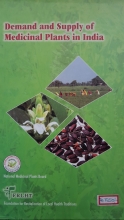
Medicinal plants are not only a major resource base for the traditional medicine & herbal industry but also provide livelihood and health security to a large segment of Indian population.
Information drawn from the published records on codified Indian Systems of Medicine (Ayurveda, Siddha, Unani, Swarigpa and Homoeopathy) and ethno-medicinal practices in the country reveals that about 6,000 plants species are used in the Indian health care traditions. It is also a matter of record that more than 9,000 registered manufacturing units are engaged in making herbal based formulations the country.
In this scenario it becomes important to know the number of medicinal plant species being consumed by the herbal manufacturing units, the quantum of such consumption and the gaps in the demand and supply of the medicinal plants.
Therefore, a study was sponsored by National Medicinal Plants board (NMPB), through the Foundation for Revitalisation of Local Health Traditions (FRLHT), Bengaluru with the objective of finding answers to issues related to demand and supply of medicinal plants in the country. This boo presents report of the study.
As the book was published in the year 2008, the data given in the book needs updation. However, the data helps us to understand the trends in demand and supply of important medicinal plants in India.
About 1178 species of medicinal plants are estimated to be in trade of which 242 species have annual consumption levels in excess of 100 metric tons/year. The domestic demand of medicinal plants has been estimated 1,95,000 MT for the year of 2014-2015 and export demand of medicinal plants has been estimated 1,34,500 MT during 2014-2015. Total consumption of herbal raw drug in the country for the year 2014-15 has been estimated at 5,12,000 MT with corresponding trade value of ₹ 5,500 Crore. The major increase has been recorded in export value which has increased from ₹ 345.80 Crore in 2005-06 to ₹ 3211 Crore in 2014-15, registering a nine fold increase in during last decade.
In recent years cultivation of medicinal plants has started gaining momentum, still a significant part of our requirements continue to be met from wild sources. So, urgent programmes to increase the cultivation of medicinal plants should be implemented and in this regard the recommendations of the book provide useful directions.
